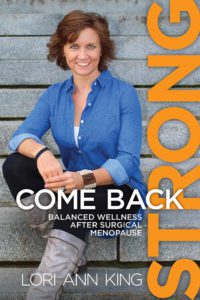Fatigue is a common complaint of menopausal woman and caffeine or sugar are a common response. However, there are alternative solutions that can help you sleep better, experience less anxiety, and get off the roller coaster of energy highs and lows that you live with. Especially if you are dealing with menopause fatigue.
 Signs of Menopause Fatigue
Signs of Menopause Fatigue
The following is a list of signs that indicate that you are not getting enough sleep in quantity or quality: Ask yourself, do you
- Have difficulty waking up in the morning?
- Require more stimulants (caffeine, sugar) to keep going?
- Utilize alcohol, sleeping pills, or other substances to wind down or fall asleep?
- Exhibit a shorter fuse than normal, especially with loved ones?
- Experience a lack of focus, creativity, or productivity?
The Importance of Sleep
Studies show that most require 7 to 9 hours of sleep each night. Good quality and quantity of sleep are critical to our health and greatly impact our hormones. After my surgery, which thrust me into sudden surgical menopause, I couldn’t fall or stay asleep. I struggled for months. I did everything possible to improve my sleep, with great results.
 Reduce Caffeine to Combat Menopause Fatigue
Reduce Caffeine to Combat Menopause Fatigue
Like most people, I believed that caffeine gave me an energy boost, but the reality was that it was contributing to my menopause fatigue. With each cup of coffee, I was borrowing energy from the future. The problem was, I was never replenishing it with rest and sleep, which left me frazzled, overtaxed, overwhelmed, and anxious.
Caffeine has been associated with irritability, mood swings, panic, anxiety, anger, sleep disturbances, PMS, fatigue, depression, hormonal imbalance, headaches, gastrointestinal distress, increased stress, and reductions in iron and calcium absorption. It also increases the appetite for sweets and fatty foods, resulting in weight gain. It can even decrease levels of estradiol (the primary form of estrogen in our bodies) and testosterone, thereby throwing off the delicate balance of our hormones and affecting our libido, strength, power, and zest for life.
If you find yourself having trouble falling asleep or staying asleep, consider reducing your caffeine intake. You can replace your favorite coffee drink with herbal teas, hot water with lemon, or a coffee substitute such as Dandy Blend or Teecino.
 Monitor Your Schedule
Monitor Your Schedule
It is common practice to fill every minute of the day, from the moment our feet hit the floor in the morning to the second our head hits the pillow. If you are anything like me, the busy-ness doesn’t even end there, as our mind continues to race.
Surgery did one thing for sure: It took me down. I was forced to rest, which was a good thing. Good, but not always easy for a type A personality like me. I work hard, and I play hard. I’ve now learned to rest as well.
I learned to monitor my days so that I don’t burn the candle at both ends, rising early and staying up late. I look at my calendar and consider the entire week as a whole. Am I at the gym at 6 am five days a week? Am I out of the house in the evening five or six nights a week? Is it all necessary? Where can I build in more rest?
Maybe instead of 5 early mornings at the gym, I can cut back to 4. As I look at my weeknight obligations, I ask myself if they fit with my passion and goals in life. If not, can I cut back or skip a few activities this week or indefinitely. If they are important, I will find my way back to them.
Here are a few questions to ask yourself when you are reviewing your calendar:
- Do the activities on my schedule this week align with my goals and priorities?
- What activities are of the highest priority to do this week:
- What activities are of least priority to do this week? Can I postpone or delegate?
- This week, where can I build in extra time for me to rest and replenish my energy?
 Learn to Say No, Empowerment During Menopause Fatigue
Learn to Say No, Empowerment During Menopause Fatigue
Often we say yes to projects and events because we never learned to say no. So, let me give you your first lesson. Repeat after me: “No, thank you.”
That’s it, really. You may modify it to make it your own based on what is being asked to something like “Thank you for thinking of me, but no I cannot do that” or “No thank you, that won’t fit into my schedule right now.”
And then, shut up! Zip it! Stop talking. REALLY.
Our tendency is to make an excuse and as soon as we do that, it becomes a game and a contest for who has the stronger will and an open door for somebody (usually someone that you love) to get you to say yes.
Two things I know:
- every time you say yes to something you are making a promise and a commitment to someone else. What you have to ask yourself in the split second it takes to say yes or no is, does your yes come with a compromise to yourself, your goals, your family, or your health?
- when you say yes to something you don’t even want to do, you are disappointing yourself. And when you do that, you open the door to negative feelings of guilt and shame, which contribute to an increase in stress and can exacerbate menopause symptoms.
 Meditate
Meditate
As much as I love going to bed early, sleeping late, and taking a nap, most days don’t allow for this. So, I learned to meditate. In the beginning, I simply set aside 15 minutes every day to be still physically. I didn’t worry about my mind or controlling my thoughts, I just learned to first control my physical body. Next, I progressed to focusing on my breath and practiced quieting my mind. This went a long way in helping me to face my day with calm and ease. It is also a great skill to practice before bed.
Final tips
In my quest for better sleep, created habits like drinking chamomile tea in the evening, turning off all screens – computer, tablet, phone – in the last couple hours before bed, and eliminating alcohol and exercise in the evening. I cut back on sugar. I restricted caffeine to before 10 am. All these things combined to help me get back on track with my sleep and feel more balanced through menopause.
If you find yourself less focused, creative, friendly, or productive, as I did, it may benefit you to slow down or take a break. As we build in more time to rest and sleep, we are better able to come back stronger, more creative, productive, and refreshed, and with renewed energy and excitement. We have more passion for our career, relationships, and life in general. We’ll find we are balanced through the transition of menopause.

You may also be interested in my first book, Come Back Strong, Balanced Wellness after Surgical Menopause.
(Not just for surgical menopause.)
(Actually, not even just for menopause! Lots of wellness tips here!
If you found this article helpful and want to say thanks, click here to buy Lori King a coffee.



 Signs of Menopause Fatigue
Signs of Menopause Fatigue Reduce Caffeine to Combat Menopause Fatigue
Reduce Caffeine to Combat Menopause Fatigue Monitor Your Schedule
Monitor Your Schedule Learn to Say No, Empowerment During Menopause Fatigue
Learn to Say No, Empowerment During Menopause Fatigue Meditate
Meditate